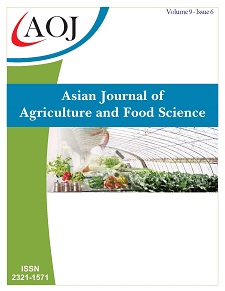Influence of Treated Rapeseed Meal on Growth Performance, Nutrient Digestibility and Blood Profile in Growing Pigs
DOI:
https://doi.org/10.24203/ajafs.v9i6.6834Keywords:
pigs, rapeseed meal, growth performance, digestibility, blood characteristicsAbstract
This study was conducted to investigate the influence of replacing part of soybean meal (SBM) with 15% treated rapeseed meal (tRSM) on growth performance, blood parametres and nutrient digestibility in young growing pigs. A total of 12 crossbred growing pigs (Slovakian White x Landrace) with an average initial body weight of 15.70 ± 1.83 kg were divided into two dietary treatments according to their body weight and sex (six pigs in each group). The experiment lasted 34 days. The rapeseed meal was treated with the product that neutralizes the negative effects of glucosinolates contained in rapeseed by-products for pigs feeding. In our study, we did not observe negative effects of tRSM on body weight, average daily gain and feed conversion ratio. In blood profile, serum urea, albumin, glucose and total chlosterol were not influenced by dietary tRSM treatment. Concentration of total proteins was decreased at the end of the experimental period in the experimental group (P<0.01). For apparent total tract digestibility acid-insoluble ash was used as marker. Partially replacing of SBM with tRSM had no significant negative effects on the apparent total tract digestibility of dry matter, crude protein and crude fat. Finally, the inclusion of 15% of treated RSM in growing pig diets had no negative effects on growth performance, nutrients digestibility and selected blood characteristics.
References
Hansen, J. Ø., Øverland, M., Skrede, A., Anderson, D. M., Collins, S. A. (2020). “A meta-analysis of the effects of dietary canola/double low rapeseed meal on growth performance of weanling and growing-finishing pigs”. Animal Feed Science and Technology, 259, 114302.ň
Kim, I. H., Hancock, J. D., Jones, D. B., Reddy, P. G. (1999). “Extrusion processing of low-inhibitor soybeans improves growth performance of early-weaned pigs”. Asian-Australasian Journal of Animal Sciences, 12(8), 1251-1257.
Skugor, A., Kjos, N. P., Sundaram, A. Y., Mydland, L. T., Ånestad, R., Tauson, A. H., Øverland, M. (2019). “Effects of long-term feeding of rapeseed meal on skeletal muscle transcriptome, production efficiency and meat quality traits in Norwegian Landrace growing-finishing pigs”. PloS one, 14(8), e0220441.
Grela, E. R., Czech, A., Kiesz, M., Wlazło, Ł., Nowakowicz-Dębek, B. (2019). “A fermented rapeseed meal additive: Effects on production performance, nutrient digestibility, colostrum immunoglobulin content and microbial flora in sows”. Animal Nutrition, 5(4), 373-379.
Adewole, D. I., Rogiewicz, A., Dyck, B., Slominski, B. A. (2016). “Chemical and nutritive characteristics of canola meal from Canadian processing facilities”. Animal Feed Science and Technology, 222, 17-30.
Wang, L. F., Beltranena, E., Zijlstra, R. T. (2017). “Diet nutrient digestibility and growth performance of weaned pigs fed Brassica napus canola meal varying in nutritive quality”. Animal Feed Science and Technology, 223, 90-98.
NATIONAL RESEARCH COUNCIL (2012). Nutrient Requirements of Swine. 11th rev. ed. Washington: National Academies Press. 400 pp.
EUROPEAN COMMISSION. Commission Regulation (EC) No 152/2009 of 27 January 2009 laying down the methods of sampling and analysis for the official control of feed. Off. J. Eur. Union. 2009, 54, 1–130.
Kraft, W. and Dürr, M. U. (2001). 30. Reference values. In Hajko & Hajková: Clinical Laboratory Diagnosis in Veterinary Medicine (Slovak/Czech edition). Bratislava: VEDA. 365 pp.
King, R. H., Eason, P. E., Kerton, D. K., Dunshea, F. R. (2001). “Evaluation of solvent-extracted canola meal for growing pigs and lactating sows”. Australian Journal of Agricultural Research, 52(10), 1033-1041.
Seneviratne, R. W., Young, M. G., Beltranena, E., Goonewardene, L. A., Newkirk, R. W., Zijlstra, R. T. (2010). “The nutritional value of expeller-pressed canola meal for grower-finisher pigs”. Journal of Animal Science, 88(6), 2073-2083.
Yun, H. M., Lei, X. J., Lee, S. I., Kim, I. H. (2018). “Rapeseed meal and canola meal can partially replace soybean meal as a protein source in finishing pigs”. Journal of Applied Animal Research, 46(1), 195-199.
Choi, H. B., Jeong, J. H., Kim, D. H., Lee, Y., Kwon, H., Kim, Y. Y. (2015). “Influence of rapeseed meal on growth performance, blood profiles, nutrient digestibility and economic benefit of growing-finishing pigs”. Asian-Australasian Journal of Animal Sciences, 28(9), 1345-1353.
Landero, J. L., Beltranena, E., Cervantes, M., Morales, A., Zijlstra, R. T. (2011). “The effect of feeding solvent-extracted canola meal on growth performance and diet nutrient digestibility in weaned pigs”. Animal Feed Science and Technology, 170(1-2), 136-140.
Liu, Y., Song, M., Maison, T., Stein, H. H. (2014). “Effects of protein concentration and heat treatment on concentration of digestible and metabolizable energy and on amino acid digestibility in four sources of canola meal fed to growing pigs”. Journal of Animal Science, 92(10), 4466-4477.
Sanjayan, N., Heo, J. M., Nyachoti, C. M. (2014). “Nutrient digestibility and growth performance of pigs fed diets with different levels of canola meal from Brassica napus black and Brassica juncea yellow”. Journal of Animal Science, 92(9), 3895-3905.
McDonnell, P., O'Shea, C., Figat, S., O'Doherty, J. V. (2010). “Influence of incrementally substituting dietary soya bean meal for rapeseed meal on nutrient digestibility, nitrogen excretion, growth performance and ammonia emissions from growing-finishing pigs”. Archives of Animal Nutrition, 64(5), 412-424.
Downloads
Published
Issue
Section
License
Copyright (c) 2021 Lukáš Bujňák, Pavel Naď, Iveta Maskaľová, František Zigo

This work is licensed under a Creative Commons Attribution-NonCommercial 4.0 International License.
Copyright © The Author(s). This article is published under the Creative Commons Attribution License (CC BY 4.0), which permits unrestricted use, distribution, and reproduction in any medium, provided the original work is properly cited.


